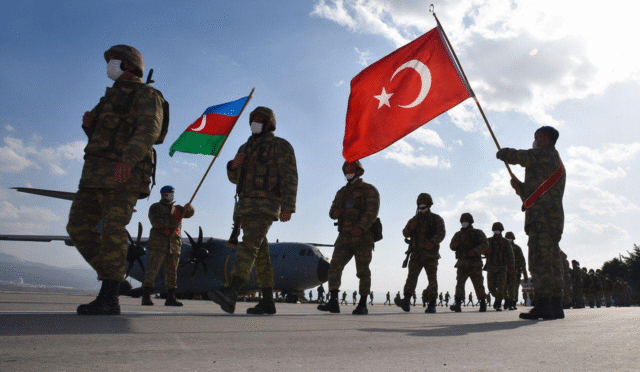In a landmark achievement for Türkiye’s burgeoning space program, DeltaV Space Technologies, a company under the auspices of the Turkish Presidency of Defense Industries, successfully conducted a hypersonic rocket test on June 1, 2025, from the Sinop Test Center. The test, which saw the rocket soar beyond 200 kilometers in altitude and reach speeds exceeding five times the speed of sound (Mach 5), marks a significant milestone in Türkiye’s quest to become a major player in space exploration and technology. This breakthrough not only demonstrates Türkiye’s advancing capabilities in hypersonic technology but also positions the nation as a leader in developing cost-effective and sustainable space systems.
A Historic Leap Forward

The successful test of the Hypersonic Systems Test Platform (HİSTEP), developed by DeltaV, represents a pivotal moment in Türkiye’s National Space Program. Launched from the Sinop Test Center, the two-stage hybrid rocket achieved an altitude of over 200 kilometers, surpassing the internationally recognized boundary of space, known as the Kármán Line (100 km). The rocket reached hypersonic speeds, exceeding 6,000 km/h (approximately 1.5 km/s), making it one of the fastest domestically developed systems in Türkiye’s history. This test also marked the first successful application of a “hot stage separation” technique in a Turkish rocket system, a critical innovation for multi-stage rockets.
Dr. Mehmet Kahraman, General Manager of DeltaV, elaborated on the significance of the test: “With this system, we have gained the capability to operate in the hypersonic speed regime, meaning speeds exceeding five times the speed of sound. Hypersonic technologies are critical and game-changing, but their development is equally challenging. Our goal is to provide Türkiye and its allies with a cost-effective, sustainable, and non-explosive test platform.” Kahraman emphasized that the HİSTEP platform is designed to be a safe, environmentally friendly alternative to traditional rocket systems, leveraging hybrid propulsion technology that combines liquid oxidizers with solid fuels.
Technical Details and Innovations

The HİSTEP rocket is a two-stage system, a design that allows it to achieve greater altitudes and speeds than single-stage rockets. The first stage propels the rocket to a predetermined altitude and velocity, after which the second stage undergoes a “hot separation,” igniting while still attached to the first stage to continue accelerating to hypersonic speeds. This technique, successfully implemented for the first time in Türkiye during this test, is a complex maneuver that requires precise engineering and control. After reaching its peak altitude, the rocket completed its mission by returning to Earth, with critical data collected in real-time to validate system performance, stage separation, and navigation capabilities.
The hybrid propulsion system used in HİSTEP is a hallmark of DeltaV’s innovative approach. Unlike traditional solid or liquid propulsion systems, hybrid rockets combine the safety and cost advantages of solid fuels with the controllability of liquid oxidizers, such as liquid oxygen and paraffin-based fuels. This technology not only reduces the risk of catastrophic explosions but also lowers production and operational costs, making it ideal for commercial and scientific applications. The successful test builds on DeltaV’s previous achievements, including the 2023 test of the Sonda Rocket System (SORS), which became the first hybrid system ignited in space, reaching an altitude of 100 km.
Strategic Implications for Türkiye’s Space Ambitions
The June 1 test is a critical step in Türkiye’s National Space Program, which was announced by President Recep Tayyip Erdoğan in 2021 with ambitious goals, including a hard landing on the Moon by 2023 and establishing Türkiye as a global space power by 2030. While the Moon mission timeline has faced delays, the HİSTEP test demonstrates significant progress toward developing indigenous launch systems capable of delivering payloads to space. The test also aligns with Türkiye’s broader Milli Teknoloji Hamlesi (National Technology Initiative), which aims to reduce dependency on foreign technology and foster self-reliance in critical sectors.
Savunma Sanayii President Prof. Dr. Haluk Görgün hailed the achievement, stating, “This historic test is not just a technical milestone; it is a testament to Türkiye’s vision of independent access to space. Our engineers, technicians, and scientists have not only broken a world record for hybrid rocket altitude but have also carried the confidence and dreams of our nation into the depths of space.” Görgün’s remarks underscore the test’s role in positioning Türkiye among the elite group of nations with advanced space capabilities.
The HİSTEP platform’s ability to reach hypersonic speeds and high altitudes opens new possibilities for Türkiye in both scientific and defense applications. Hypersonic technologies, which enable rapid and precise delivery of payloads, are considered “game-changers” in modern aerospace and defense systems. The platform’s versatility makes it suitable for a range of missions, including microgravity experiments, atmospheric re-entry tests, and hypersonic research, all of which are critical for advancing Türkiye’s space and defense industries.
A Record-Breaking Achievement

The HİSTEP test set a new global record for altitude achieved by a hybrid rocket, surpassing previous benchmarks by a significant margin. DeltaV’s official statement noted that the 200+ km altitude represents a “world record” for hybrid propulsion systems, highlighting Türkiye’s technological edge in this domain. The successful execution of multi-stage separation, system validation, and real-time data collection further demonstrates the maturity of DeltaV’s engineering capabilities.
This achievement builds on DeltaV’s earlier successes, such as the 2021 SORS tests, which validated hybrid rocket motors for Türkiye’s planned lunar mission. In those tests, conducted in Sinop, the SORS rocket demonstrated its ability to exceed the 100 km space boundary, with its hybrid propulsion system (HİS) becoming the first of its kind to ignite in space. The 2025 HİSTEP test takes these accomplishments to new heights, both literally and figuratively, by achieving greater altitudes and speeds while incorporating advanced staging techniques.
Broader Context and Future Prospects
The success of the HİSTEP test comes at a time when global interest in hypersonic and space technologies is intensifying. Nations like the United States, China, and Russia are investing heavily in hypersonic systems for both civilian and military applications, while commercial entities like SpaceX and Virgin Galactic are driving innovation in cost-effective space access. Türkiye’s focus on hybrid propulsion offers a unique niche, combining safety, affordability, and environmental considerations—attributes that could make its systems attractive for international partnerships and commercial ventures.
DeltaV’s efforts are part of a broader ecosystem of Turkish aerospace innovation. Companies like Roketsan, which recently achieved success with its ATMACA cruise missile, and academic institutions like Ondokuz Mayıs University, which contribute to space research, are helping to build a robust national space industry. The Turkish Space Agency (TUA), established to coordinate these efforts, has set a goal of making Türkiye one of the top seven or eight space-faring nations by 2030. The HİSTEP test is a concrete step toward that vision, demonstrating Türkiye’s ability to compete on the global stage.
Looking ahead, DeltaV plans to further refine the HİSTEP platform, with additional tests to enhance reliability and expand its capabilities. The company aims to develop systems that can support satellite launches, space tourism, and other commercial applications, potentially capturing a share of the multi-billion-dollar global space market. Former DeltaV General Manager Doç. Dr. Arif Karabeyoğlu, who led the company until 2023, previously emphasized the economic potential of such technologies, noting that they could enable Türkiye to provide launch services to other nations, creating significant revenue streams.
A Milestone for National Pride

The successful HİSTEP test has sparked widespread pride and excitement in Türkiye, as evidenced by social media posts on platforms like X. Users celebrated the achievement as a “critical threshold” in the global space race, with some highlighting the test’s strategic importance for Türkiye’s independence in space exploration. One post described the test as a “turning point” in Türkiye’s journey toward becoming a space power, while others praised the ingenuity of Turkish engineers and the vision of national leaders.
As Türkiye continues to invest in its space program, the DeltaV HİSTEP test stands as a testament to the nation’s growing technological prowess and determination to carve out a place among the world’s space-faring nations. With hybrid propulsion systems leading the way, Türkiye is not only reaching for the stars but also laying the foundation for a sustainable and innovative future in space exploration.







